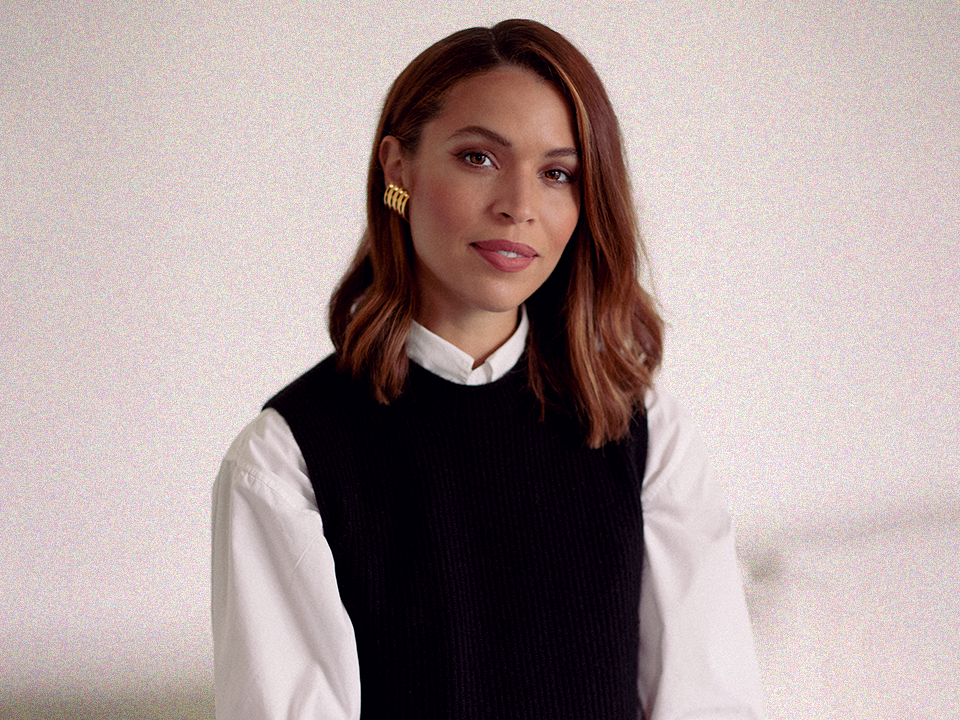Cleo Wade’s Poems Are Here to Help You Through Tender Times
The poet and author of ‘Remember Love’ drops some major wisdom.
Since 2015, poet Cleo Wade has been setting up an “Are You Okay?” booth in public parks, asking people how they’re really, truly doing. “Something I think is really cool and important about asking that question is also waiting and giving space for people to melt from their armor that answers the question to allow their personhood to answer,” she tells Wondermind.
When she’s not striking up deep conversations with strangers, Wade is busy publishing poetry collections that speak to the importance of self-love and community and offer something to “hold your hand and be your companion as you are walking home to yourself,” she says.
Her latest book, Remember Love: Words for Tender Times, is out now. With poems like “rock bottom” and “what’s held,” Wade’s work leaves space for readers to embrace and learn from tough feelings. “We really need resources and encouraging words or mantras or poems or affirmations to help us cope with change,” she says. “So often we try to hack change or heartbreak or grief, and those are such long and complicated things to go through that fundamentally make us different people. [Turning] our life into this meditation allows us to cope with things with more ease and love of self rather than saying, ‘Here's how I get out of it.’ It's more like, ‘Here's how I live with and through this and love myself with urgency.’”
Here, Wade shares how she processes her emotions, helpful ways to reframe self-love, and the poem that’s speaking to her lately.
[Sign up here to never miss these candid conversations delivered straight to your inbox.]
WM: How are you doing lately?
Cleo Wade: I'm doing as well as I could given the circumstances of our world and my own life. I just got off the first leg of touring this book, and it was such a beautiful and inspiring experience and also a lot of energy that I feel so honored to be able to hold.
I think because I hold it nonetheless, whenever you're holding energy for anyone—even if it's a single friend going through something or a room full of people going through various things—it's so important to have a practice of how you let go of what you're holding.
So I've been in the process and practice of just letting go, whether that's intentionalizing my shower so when the water hits me, I'm letting go of any energy that I was holding for another person that I don't need to continue holding. Or if I go on a walk as I take in fresh air, I just say, “I'm allowing this to bring new energy into my being.” So I'm a little hazy because I don't think I'm feeling totally myself because I'm in such a process of trying to get back to [myself].
WM: What are some ways you sit with and process your own emotions?
CW: In sadness and grief, I think it's really important and feels good to locate your own tears if you can. I write about having that revelation in my own life where I was someone who, while I write really sensitive topics and really emotional ideas, was like, “I'm not a crier.” I remember saying to my therapist, “I feel like I hid my tears for so long, they started hiding from me.” I really couldn't locate them when I felt that they would serve what I was going through and bring that kind of cleansing clarity. I really felt disconnected with this water flow in my body.
When I started tracing back how that came to be, I realized just how much the world tells us not to cry. Your parents will tell you not to cry, and your teachers will tell you not to cry. And then you’re not supposed to cry at work because that’s inappropriate. And it's like, where are we allowed to have this emotion? And why does our body want to have it? I wrote this poem that says, “The tears, they shed and shed. It is a gift.” It is a gift to be able to release what I can no longer hold. … Our body is releasing stories. Our body is releasing these narratives and ideas and these weights that are keeping us stagnant or stuck.
To decide in moments of sadness or in grief that they don't always require your strength is critical. To find the space or people who can welcome you and help you find the release of your tears is really important.
WM: We're obviously in really tender times right now, as you call them in the book. Are there any poems in your book that you're holding close?
CW: There was a poem that we decided to post today from the book on Instagram. I hadn't looked at it in a while, and I was like, Wow. I wish I would've read that poem more as I was touring. It's a poem called “some types of sadness,” and it really focuses on this way we can acknowledge the depths of how sadness enters into our lives while also maintaining this line of hope and understanding that the saddest day of your life is not your life. … Even on our saddest day, even when the light is very, very faint, it is there, and light is usually leading to more light.
WM: What stigmas or misconceptions about mental health tend to bug you?
CW: Self-care is often talked about as a battle. You either win or you lose. Something I noticed a few years ago is people would come to my tours and be like, “Really quick question: How'd you figure out how to love yourself?” As if there was a switch you learned how to flip or didn't, or some people were built with it and some people weren't.
I write in the book that self-love manifests more as a bird in flight. Sometimes the elements are riding with you and the wind is beneath your wings. Sometimes there's rain and hail and you're trying to get to the safety of the south to survive your winter. Sometimes you can't and you're hunkering down. It's a real relationship within.
I think it's so much more helpful when we talk about self-love as something we live with and through, similarly to grief. You don't have a grieving period that ends when you lose someone you really love and was important to you. You live with that loss forever. I think it really makes people feel defeated when they feel like they're not making progress in grief because they think they're supposed to just stop feeling sad one day when really, the sadness just comes in true waves of different sizes and temperatures, but forever and ever you swim in those waters.
We talk about it [like a lightswitch moment] culturally, which is probably what's created that stigma. A lot of people will sit down for an interview and be like, “Yes, and then when I learned to love myself….”
That's why language is so important to how we frame our stories. What they really mean is they found the value in this quest that is constant for love of self, in this idea that only comes with constant practice. So what they really mean is: “I found my practice of loving myself and practice changes every day, and it changes with age, and it changes with circumstance, and it changes with experience.”
That, I think, is so critical to why people think, Well, they just found it or they just got it. It doesn't really work that way.
WM: Yes, it’s frustrating when people say they simply stopped caring what others think.
CW: Words are so important. … What they’re saying is they found the value in caring about what they want to do more than they care about other people's opinions. But it does not mean that you don't have to grapple with other people's opinions. It just means that you found what outweighs them in your value system.
That is a critical concept to [think], I just found that my freedom and ability to feel normal, in whatever my normalcy is, was more important. Whatever I want out of my life, that is more important than wearing this mask for these exterior people.
WM: What message would you like to leave readers with?
CW: Always remember that our mental health is something we have the power to root into our heart space. This idea that mental health belongs solely to the mind is important, and we can also root it into something that is really deeply spiritual and heartfelt because we start where the feelings are, and then our mental health and our minds are really how we're synthesizing these feelings.
When we can say, “Everything I feel is valid, and everything I feel is important,” we can let go of inner shame before it gets here. It's helpful to say, “Everything that comes out of my heart is real, and therefore it deserves my love, attention, and care.”
My hope for all of our mental health struggles, and something I have found that was deeply helpful in mine, is allowing myself to love the feelings I had no matter what they looked like or if I didn't like that I was having them or if I thought they were wrong. Because once they got into my mental synthesizing space, I could really look at them or get help with them in a way that didn't create these extra steps of shame and judgment around what I was feeling.
This interview has been edited and condensed for length and clarity.
Wondermind does not provide medical advice, diagnosis, or treatment. Any information published on this website or by this brand is not intended as a replacement for medical advice. Always consult a qualified health or mental health professional with any questions or concerns about your mental health.




